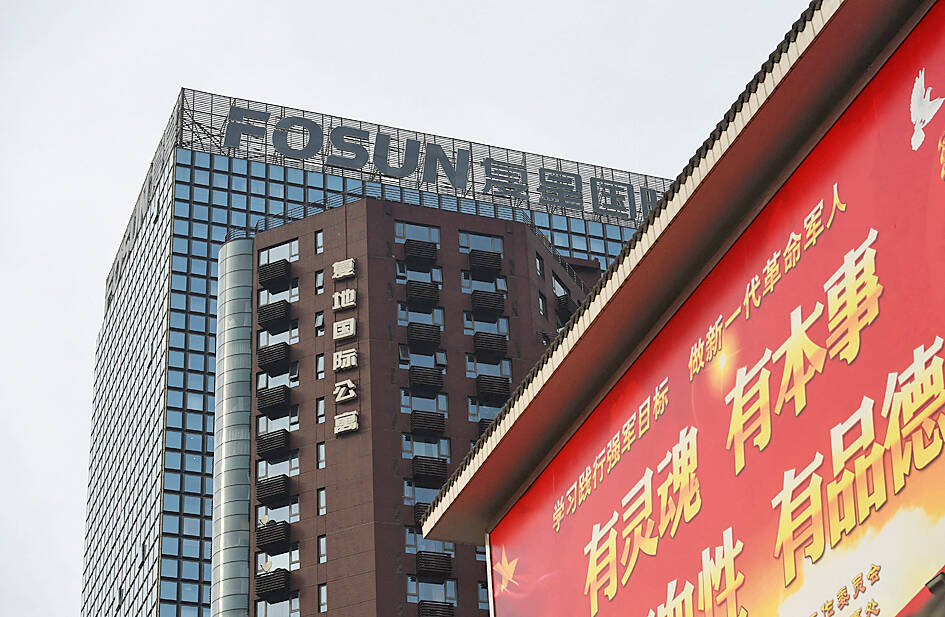Investors are stepping up scrutiny of Fosun Group (復星集團), one of China’s largest private-sector conglomerates, as it faces as much as about US$8 billion in bond repayments through next year following signs of distress in credit markets.
Some of Fosun’s US dollar bonds were yesterday on pace for record lows, extending declines following a drop on Tuesday that was the worst since a rout in June, when broader fears of contagion from a crisis in China’s property debt flared.
Shares of Fosun International Ltd (復星國際), the group’s most-important arm, yesterday slid as much as 9.6 percent in Hong Kong to HK$4.41, the lowest level since November 2012.

Photo: AFP
Authorities including banking watchdog China Banking and Insurance Regulatory Commission have told large lenders and state-owned enterprises to start a round of checks on their financial exposure to Fosun, people familiar with the matter said earlier this week.
The group’s businesses span everything from Club Med to French fashion house Lanvin and the exclusive distributor of BioNTech SE’s COVID-19 vaccine in Greater China.
The Beijing branch of the State-owned Assets Supervision and Administration Commission asked local state-owned enterprises for details about their links to Fosun that include stock holdings, debt lending and guarantees, the people said.
Fosun said in a statement yesterday that the commission did not ask banks to check their financial exposure to Fosun, and the banks that worked with Fosun did not receive any notice about this after checking with regulators via “various channels.”
The commission did not immediately respond to a Bloomberg request for comment.
Moody’s Investors Service last month downgraded the conglomerate’s flagship operation further into junk territory for reasons including “elevated refinancing pressure” and risks related to plans to divest assets.
Fosun entities earlier this month disclosed intentions to pare their stakes in the group’s publicly listed tourism and pharmaceutical units.
Several Fosun group entities have been planning to pare stakes in other publicly held Fosun businesses.
The tourism arm’s shares plunged a record 21 percent on Tuesday last week as Fosun International sold a 2 percent stake at a 15 percent discount to previous market prices.
Stakes in a miner and a liquor company were also sold off in recent weeks while another entity plans to sell as much as 3 percent of Shanghai Fosun Pharmaceutical Group Co (上海復星醫藥集團).
The moves have raised concerns about how Fosun would balance liquidity needs. Cash holdings at Fosun International were 117.7 billion yuan (US$16.9 billion) as of June 30, while total liabilities were 651 billion yuan, 40 percent of which was interest-bearing borrowings.
Some offshore bonds guaranteed by the firm have dropped below US$0.45 on the dollar, well into what is considered distressed territory.
Fosun International executive director Gong Ping (龔平) said Fosun’s recent share sale was aimed at optimizing its asset portfolio, and was not a response only to the current market environment, the statement said.

Semiconductor business between Taiwan and the US is a “win-win” model for both sides given the high level of complementarity, the government said yesterday responding to tariff threats from US President Donald Trump. Home to the world’s largest contract chipmaker, Taiwan Semiconductor Manufacturing Co (TSMC, 台積電), Taiwan is a key link in the global technology supply chain for companies such as Apple Inc and Nvidia Corp. Trump said on Monday he plans to impose tariffs on imported chips, pharmaceuticals and steel in an effort to get the producers to make them in the US. “Taiwan and the US semiconductor and other technology industries

The US Federal Reserve is expected to announce a pause in rate cuts on Wednesday, as policymakers look to continue tackling inflation under close and vocal scrutiny from US President Donald Trump. The Fed cut its key lending rate by a full percentage point in the final four months of last year and indicated it would move more cautiously going forward amid an uptick in inflation away from its long-term target of 2 percent. “I think they will do nothing, and I think they should do nothing,” Federal Reserve Bank of St Louis former president Jim Bullard said. “I think the

SMALL AND EFFICIENT: The Chinese AI app’s initial success has spurred worries in the US that its tech giants’ massive AI spending needs re-evaluation, a market strategist said Chinese artificial intelligence (AI) start-up DeepSeek’s (深度求索) eponymous AI assistant rocketed to the top of Apple Inc’s iPhone download charts, stirring doubts in Silicon Valley about the strength of the US’ technological dominance. The app’s underlying AI model is widely seen as competitive with OpenAI and Meta Platforms Inc’s latest. Its claim that it cost much less to train and develop triggered share moves across Asia’s supply chain. Chinese tech firms linked to DeepSeek, such as Iflytek Co (科大訊飛), surged yesterday, while chipmaking tool makers like Advantest Corp slumped on the potential threat to demand for Nvidia Corp’s AI accelerators. US stock

Cryptocurrencies gave a lukewarm reception to US President Donald Trump’s first policy moves on digital assets, notching small gains after he commissioned a report on regulation and a crypto reserve. Bitcoin has been broadly steady since Trump took office on Monday and was trading at about US$105,000 yesterday as some of the euphoria around a hoped-for revolution in cryptocurrency regulation ebbed. Smaller cryptocurrency ether has likewise had a fairly steady week, although was up 5 percent in the Asia day to US$3,420. Bitcoin had been one of the most spectacular “Trump trades” in financial markets, gaining 50 percent to break above US$100,000 and